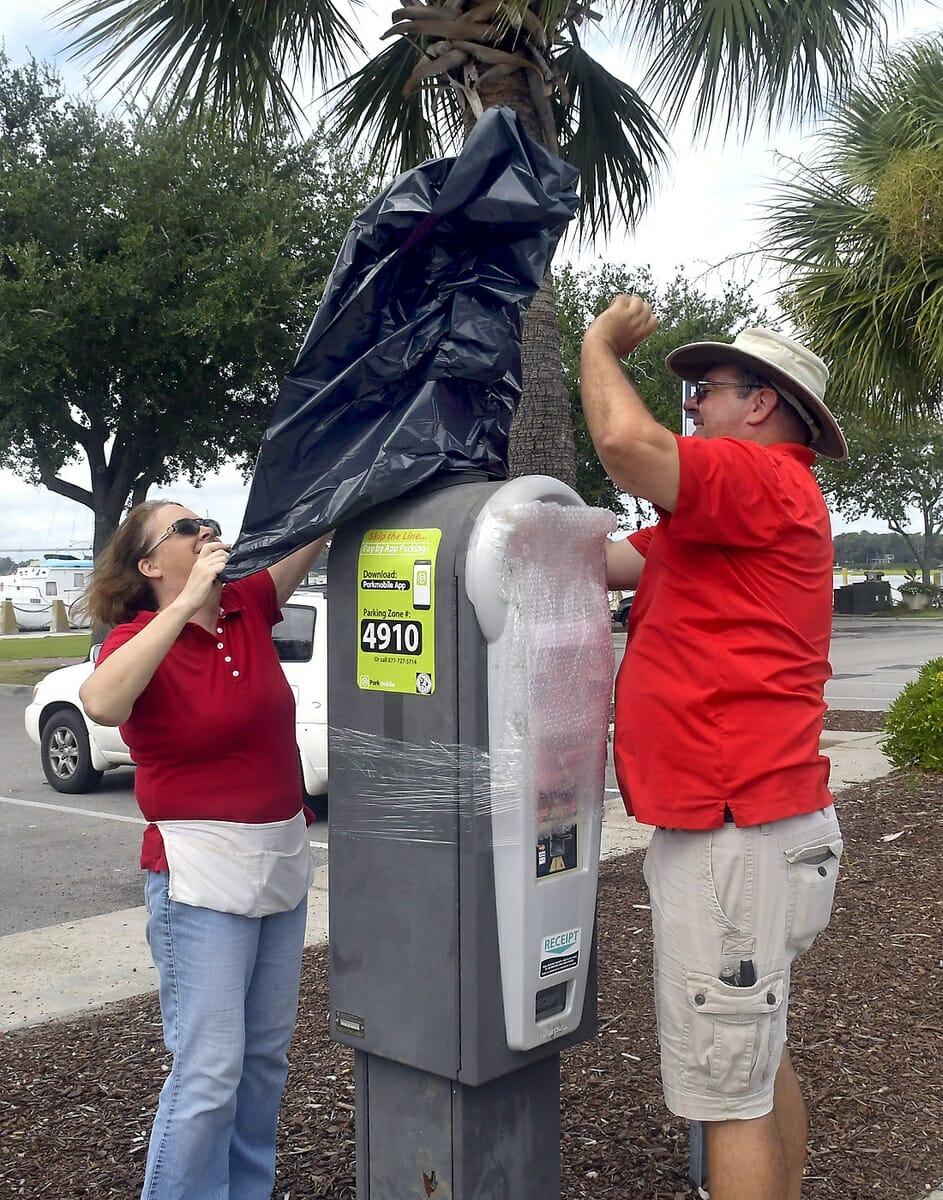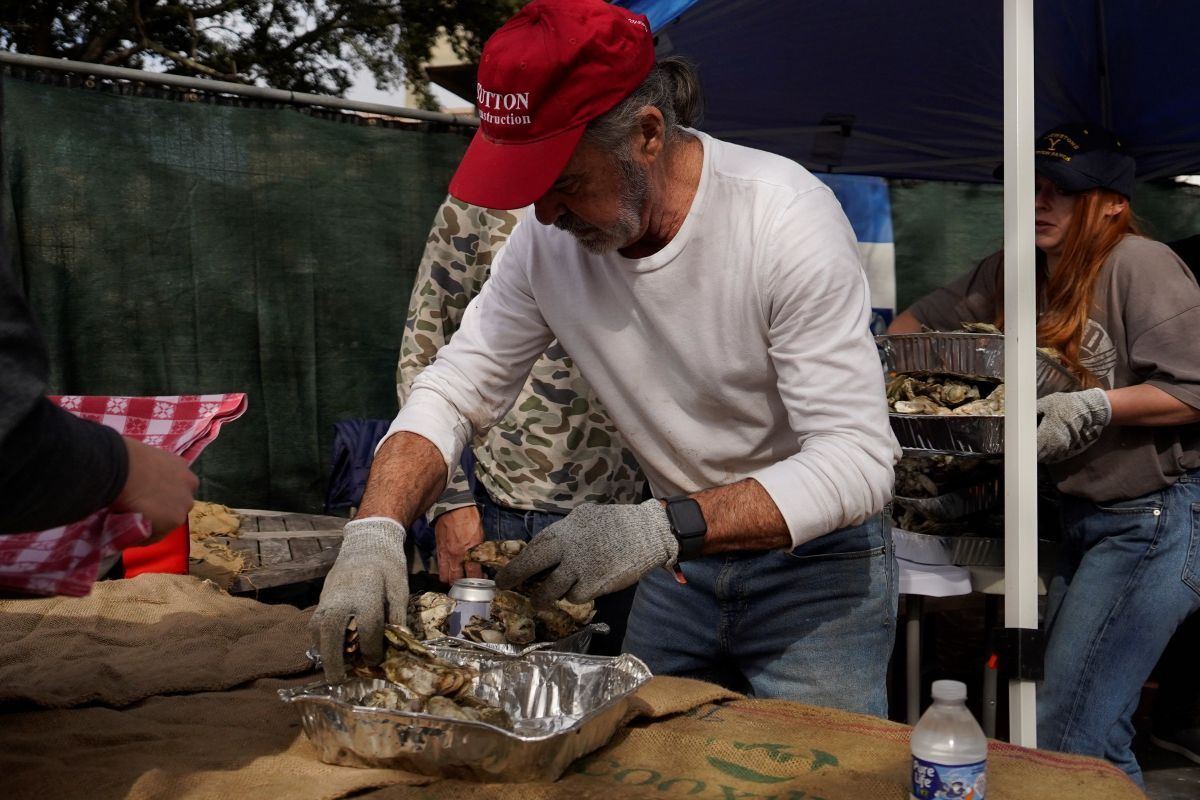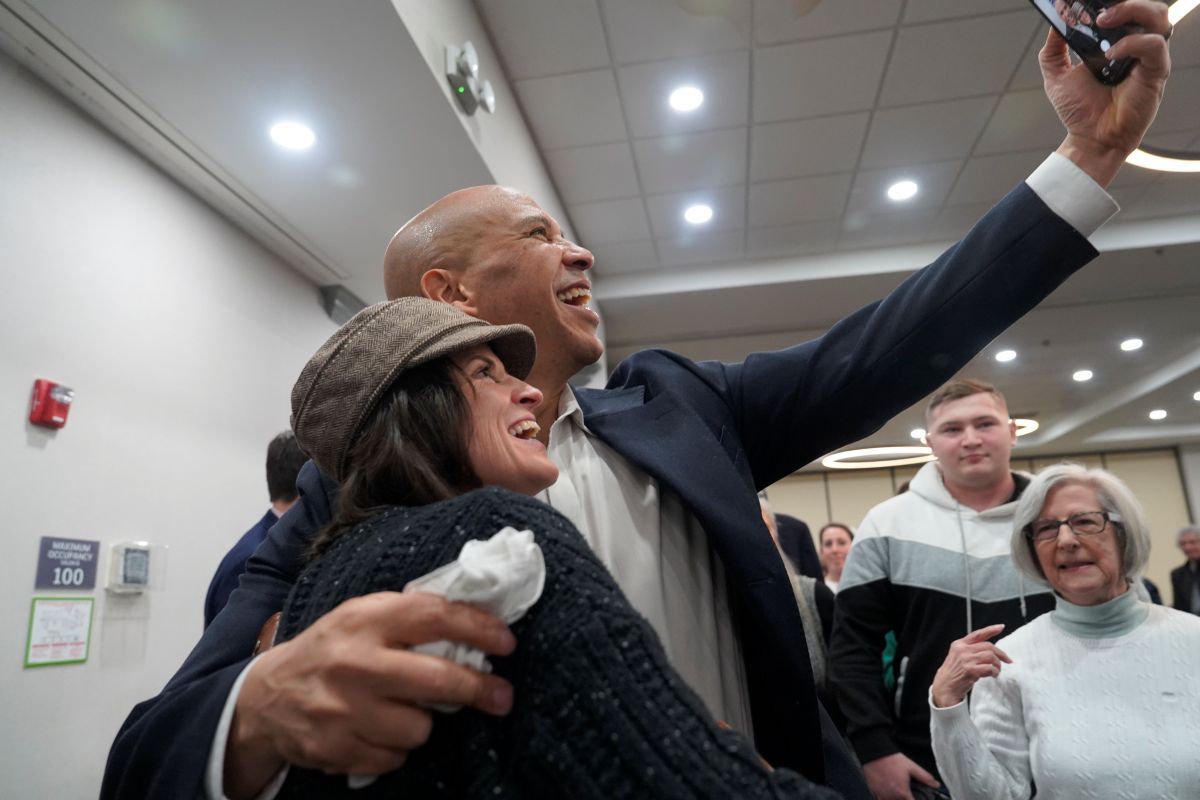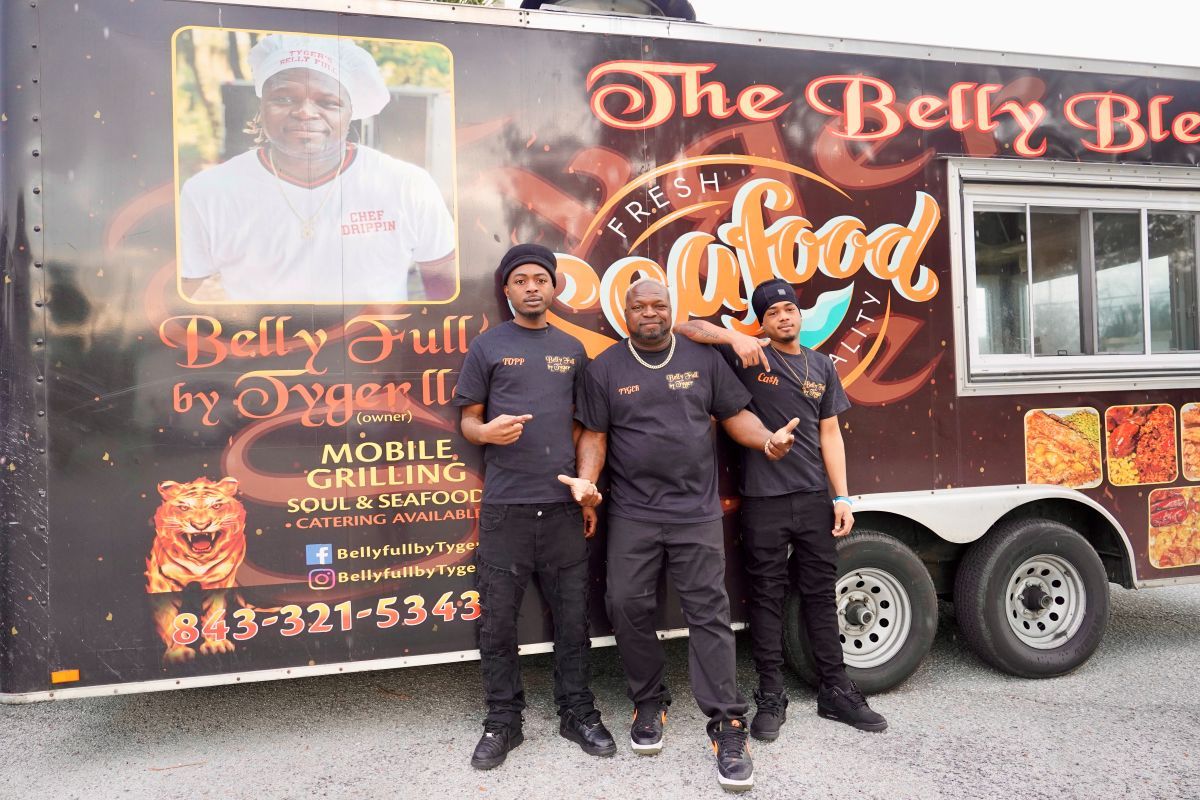Presidential hopeful finds many Democratic voters still undecided
By MINDY LUCAS
Sally Domby, of Beaufort, and Donna Beer, of Okatie, waited along with dozens of others to have their pictures made with presidential hopeful Julian Castro, in town recently for a “meet and greet.”
Held at the Beaufort County Black Chamber of Commerce on Friday, Aug. 31, the breakfast event drew somewhere between 200 and 250 people, who turned out to hear the Democratic candidate speak on a range of issues from gun control to immigration to education and the economy.
As Domby and Beer waited patiently in line, they talked about what they thought of Castro, who spoke for a little more than 30 minutes, and what they’d ultimately like to see in a president.
“It would be nice to have someone thoughtful and reasonable and compassionate and intelligent,” said Domby.
On health care, Castro told those gathered he wanted to strengthen Medicare and make it available for those who want it, while allowing Americans who like their current plans to stay on those.
“What I don’t believe is that the profit motive of “Big Pharma” or big insurance companies should ever determine whether someone gets care,” he said.
On the economy, Castro said he wants to raise minimum wage to at least $15 an hour and ensure the tax code rewards people who work for a living instead of rewarding profitable corporations who paid no federal tax.
“If you work hard in our country, then by all means you should enjoy the rewards of that success,” he said. “But for the last 40 years, we’ve been asking less and less of the people at the top and of corporations and more and more of the middle class and the working poor and people who are poor.”
On immigration, Castro said President Trump was trying to “make immigrants the scapegoat for all the other things that people perceive are wrong in this country.”
Among his proposals, Castro wants to expand immigration courts, put undocumented immigrants who have not committed a serious crime on a pathway to citizenship, and fix the current immigration system.
He also called for a 21st-century Marshall plan for countries like Honduras, El Salvador and Guatemala.
“So people can find safety and opportunity at home instead of having to come to the United States for those things,” he said.
In line after the event, Beer, a volunteer for the Warren campaign, said while she was backing the senator, she felt it was important to hear what all the candidates have to say.
“Whoever wins the primary, we will get behind them,” she said.
Getting behind whoever becomes the nominee seemed to be a common theme among those gathered Friday to hear the former San Antonio Mayor and Housing Secretary for President Obama.
It was a crowd interested in hearing what Castro had to say but not entirely committed to any one candidate either.
Domby, for example, also likes Mass. Senator Elizabeth Warren and South Bend, Ind. Mayor Pete Buttigieg.
Domby went to see Buttigieg when he visited Beaufort earlier in July. Author Marianne Williamson also made a campaign stop in Beaufort in August.
Dale Friedman who attended Friday’s event, was also undecided but said the recent candidate visits are way to get a better idea of where each stands on such issues as gun control and immigration reform.
“We will worry about electability as we get closer to the primary,” said the Beaufort native.
Steve McIntyre, who was sitting next to Friedman, added that Democrats had “a lot of good choices and good candidates” to choose from.
“I’d take of all of those over the current disaster,” he said.
In town visiting from New York City, McIntyre also said it was important for Democrats to “take back the Senate.”
“I wish more people would talk about that,” he said.
Castro will take the stage along with nine others for the third Democratic debate of the year to be held on Sept. 12 in Houston.
Julian Castro sat down for a one-on-one talk with The Island News on just a few of the more high profile issues of the race and what South Carolinians are telling him.
Q: You were in Columbia yesterday meeting with community leaders there on gun control. How do you think people here, in a state that traditionally votes Republican but that went through the horrific Charleston church shootings, have received your message and your plan to end gun violence?
Americans in every corner of the country are ready for common-sense gun safety legislation, because we’ve seen far too many of these incidents, whether it was in Charleston in 2015, or El Paso just a few weeks ago.
People are tired of politicians who won’t stand up to the NRA and take action, even the most basic action like universal background checks to keep all of our families safer. A good example of that is after the Dayton incident, Governor Mike DeWine of Ohio stood up in front of a crowd to deliver remarks about what had happened. It was very telling that a crowd of both Democrats and Republicans shouted him down by saying, “Do something. Do something.”
We’re in a new era when it comes to Americans demanding action on gun safety legislation, and that’s begun to change the way that especially public servants on the Democratic side have handled the issue. People are speaking out against the NRA much more frequently. I believe that it’s lost a lot of the aura of invisibility that it used to have, and folks realize we can have common sense gun legislation and still allow for people to go hunting and sporting and for home defense.
Q.: With about 258,000 people, South Carolina’s Hispanic population is the 29th largest in the nation, according to the Pew. You have a proposal to decriminalize unauthorized border crossings. Do you think that’s the answer, or part of the solution to the immigration issue, and how does trying to solve the immediate problems with the crisis at the border fit in with that?
A decriminalized way of doing it was the way that it was done for 60 years, even under Presidents Reagan and the first Bush.
This law that President Trump has weaponized to separate migrant parents from their little children is a law that, even though it was around, was never used. It’s very telling that Donald Trump has weaponized it.
So, I believe we can have consequences when someone crosses the border. We can deal with those consequences in a civil court instead of in a criminal context, because I want to guarantee that we never have these kinds of cruel family separations again. We can still accomplish the business of what we need to on immigration and keep our borders secure but not allow for the kind of cruelty that Donald Trump is showing.
Q.: As the 10th candidate to qualify for the September debate, will you change your strategy now in order to set yourself apart from those candidates leading in the polls?
There’s no question this is a new phase in the campaign. Now that there are 10 candidates that the people are going to be focused on, it’s going to give all of the candidates an opportunity to articulate their vision for the country and define themselves.
I’m not going to change anything radically in my campaign, but I am looking forward to the opportunity of providing contrast and letting people know what I’m about.
I have focused a lot in this campaign on what families need to prosper in the 21st century. We’ve put out plans on housing, on education, on how we can expect more from wealthy corporations and people at the top, so that we can provide things in this country like universal healthcare and universal pre-K for 3- and 4-year-olds.
So I think that the more people are able to compare both my record and my vision for the future of the country against the other candidates, the better that I’m going to do.
Q.: Education and an economic plan for working families are part of your platform and have been cornerstones of the Democratic party. How does that rank with your other platform messages of protecting animals and wildlife, housing and lead poisoning?
The way I’ve seen it is this is a long campaign and during the course of the campaign we’re releasing policy at different points. All of it is important because all of it relates to how we live our lives every day and so, I look forward to tackling the climate crisis soon, and we’re going to continue to speak on health care. There are just a number of issues and we’re releasing it about every two to three weeks now.
Q.: Will we see you do more now to take on the front-runner, Joe Biden, or do you think it’s more important to stress electability and how to defeat President Trump?
I think that Democratic candidates are very focused on beating Donald Trump and that’s where most of our focus is going to be.
At the same time, of course, there’s going to be some contrast among the candidates because that’s also how you let voters know what the differences are. I expect as we get into the fall and into the winter, there’s going to be more contrast among the candidates as well.
Q.: On your visits here to the Palmetto State, what are South Carolinians telling you, whether they’re undecided or have told you they’re voting for you, is important to them?
I think no matter where you go, including here in South Carolina, people talk about the basic issues they’re dealing with – health care, housing. I was in Columbia yesterday and heard a good bit about how much the rent had gone up there. And everybody wants to beat Donald Trump.
South Carolina is interesting also because I think that the perception of this state has not caught up to the reality. There’s been a tremendous amount of investment, for instance, here. In many ways, it’s a state that is at the leading edge of that, and a lot of opportunity has been created.
At the same time, of course, it’s a state that’s rooted in a tremendous amount of history and a lot of that history is painful history like my home state of Texas. So it’s fascinating to watch as this state, with it’s rich history, in some ways represents the future of the country. I’ve enjoyed getting out here and my visits here.







